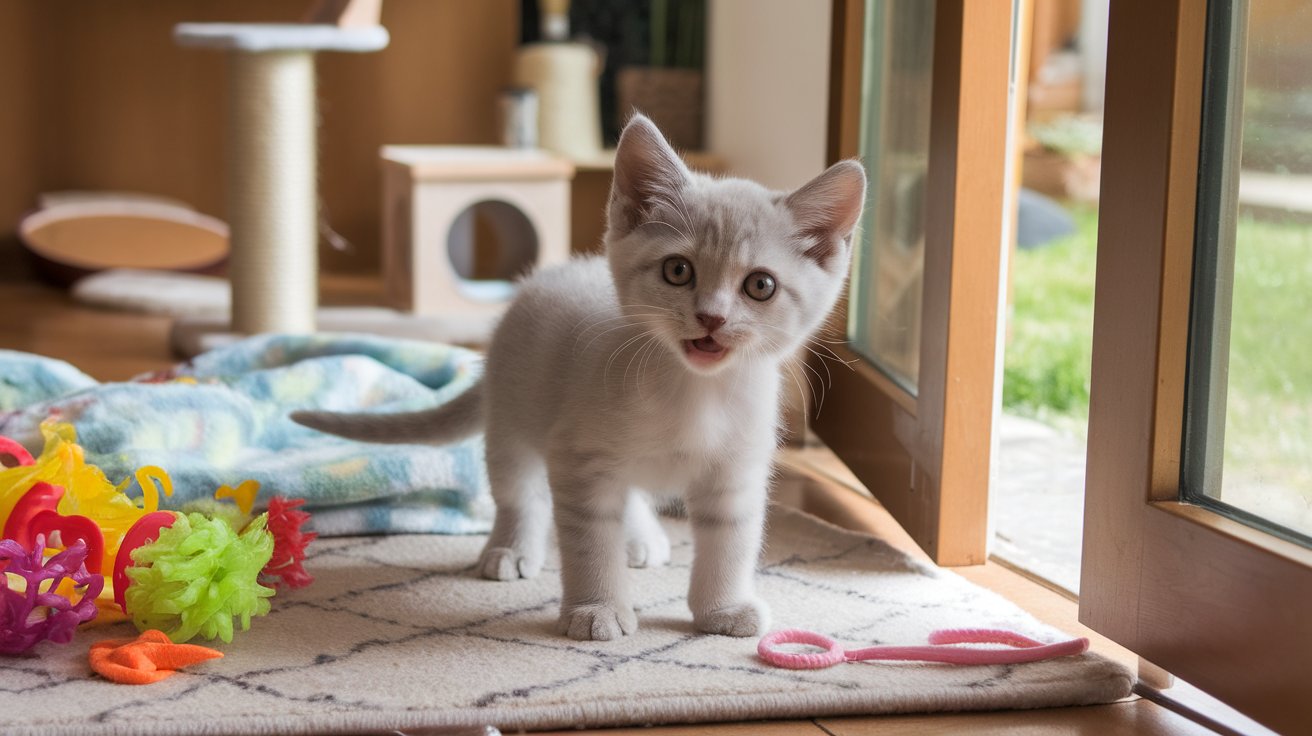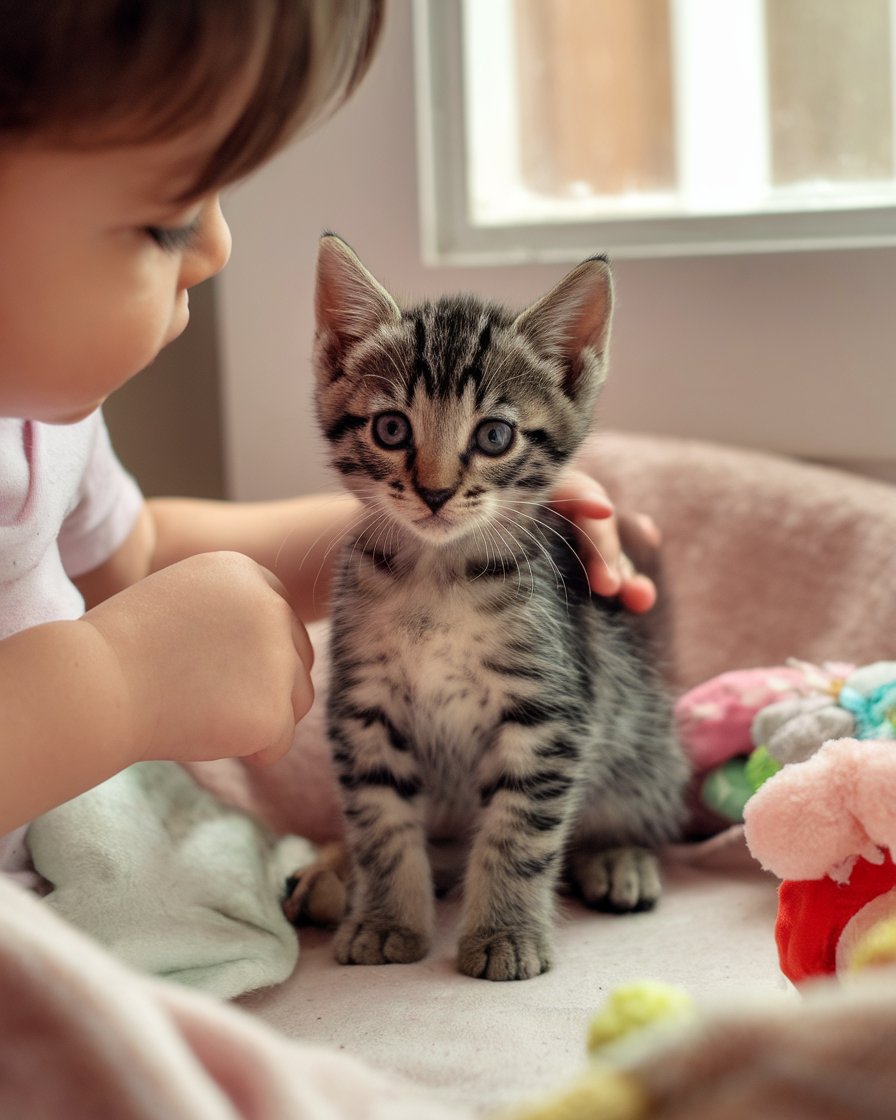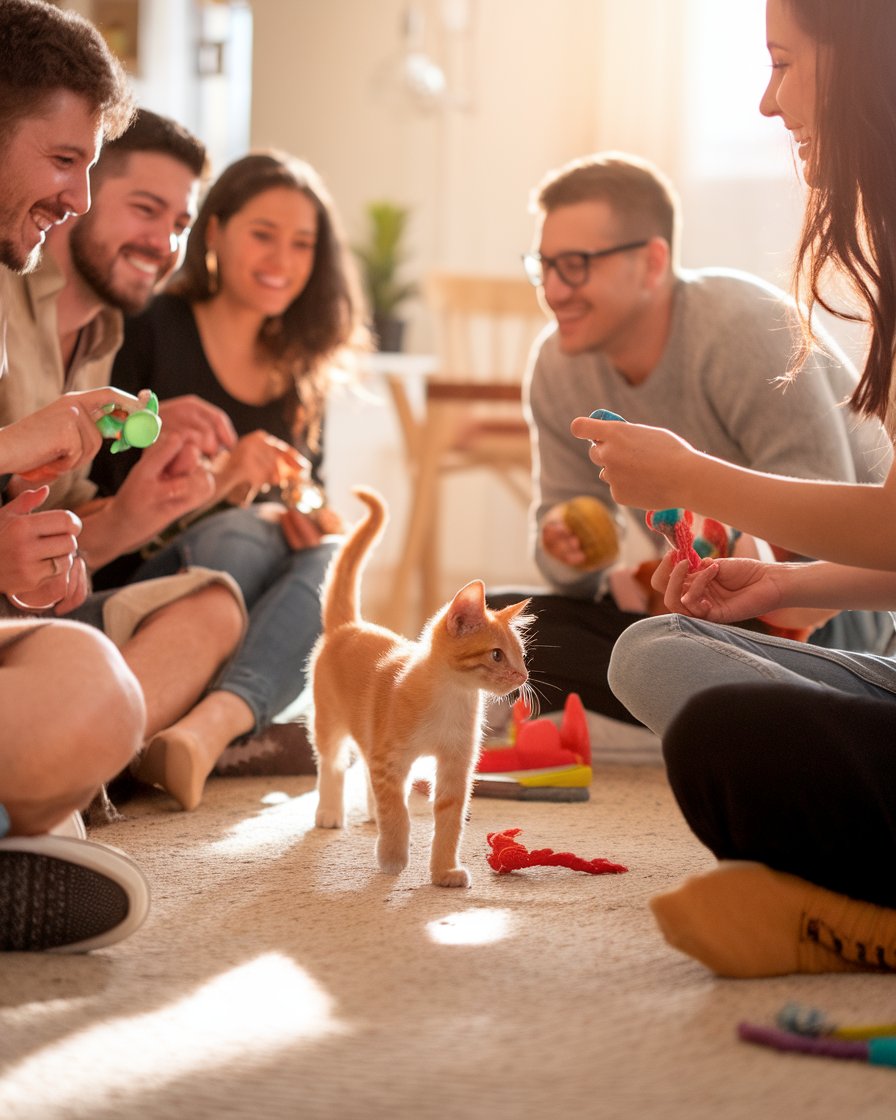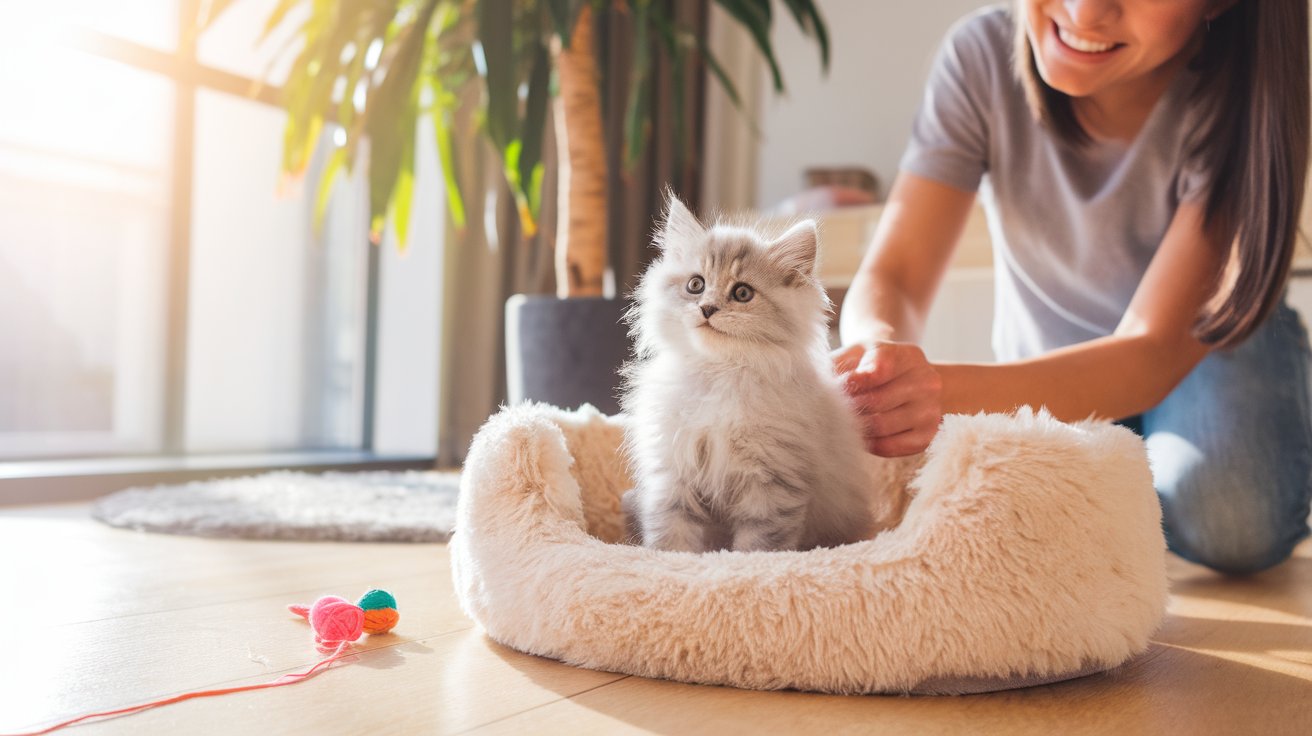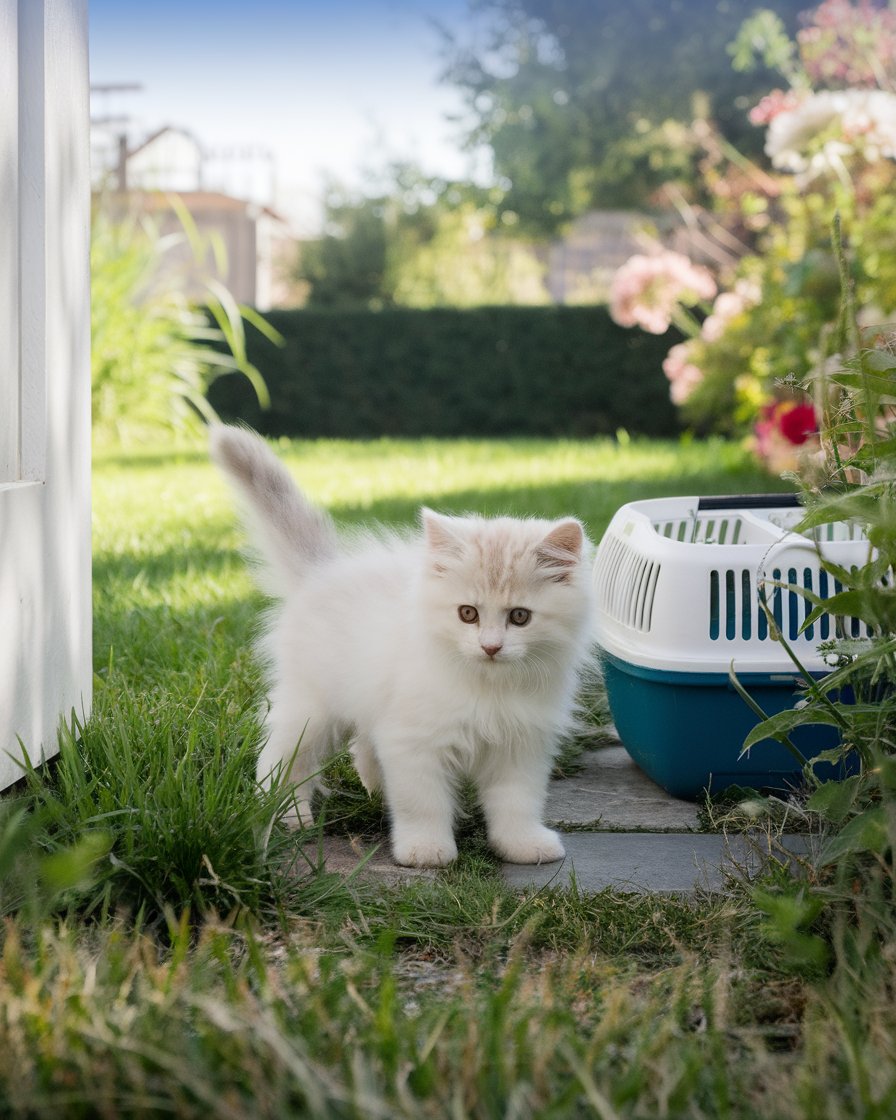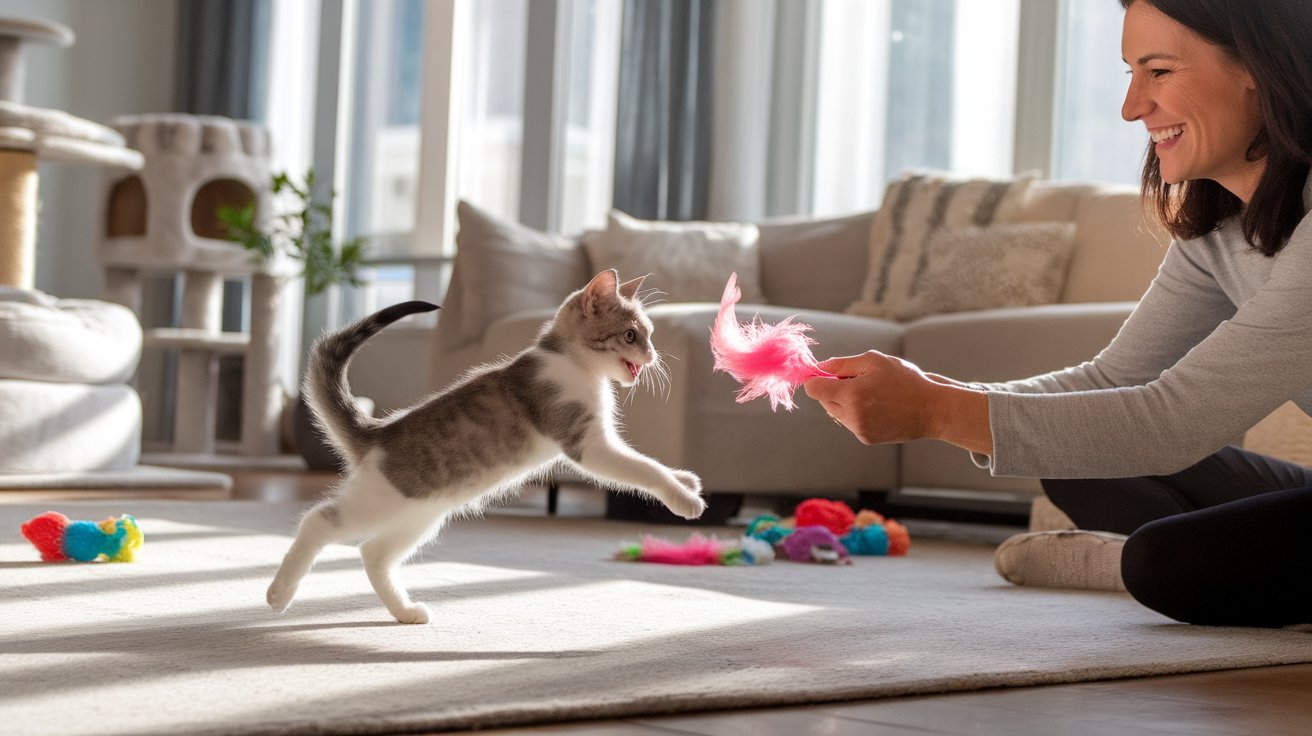Introduction
Socializing your new kitten is an essential part of helping them become a confident and well-adjusted adult cat. The early kitten socialization window, usually between two to eight weeks, is the perfect time to introduce them to new environments, people, and experiences. Bringing your kitten home during this period allows your kitten to adjust to their new surroundings with ease. By allowing your kitten gentle exposure to different stimuli, you can help them become a well-socialized cat, less fearful of the world around them.
Even if your kitten is older, it’s still possible to properly socialize them. While early socialization is key, you can continue the kitten socialization process by introducing them to new things slowly and giving them time to adjust. If they show signs of fear, try again another day to avoid overwhelming them. This patience and care will allow your kitten to become familiar with their surroundings and new people at their own pace.
Key Takeaways
The kitten socialization window, from two to eight weeks, is the ideal time to introduce new environments, people, and experiences.
Bringing your kitten home during this window helps them adapt to their surroundings more easily.
Early socialization is key, but older kittens can still be properly socialized with gradual exposure.
Watching for signs of fear and trying again another day helps ensure a well-socialized and confident kitten.
Consistent, positive interactions with your kitten solidify their social skills over time.
A safe, comfortable space with the right tools helps make the kitten socialization process smoother.
When to Start Socializing Your Kitten
Socializing your kitten at the right time is essential for helping them become a well-adjusted and confident cat. The earlier you begin, the easier it will be for your kitten to adapt to new surroundings, people, and even other animals. Starting early in your kitten’s life not only reduces their fear of the unknown but also helps them learn how to navigate the world with curiosity instead of stress. Waiting too long to give your kitten these experiences can result in an untrusting adult cat who may struggle with new situations later in life.
Critical Socialization Window
The critical socialization window for kittens spans from two to eight weeks of age, and this is the best time to introduce your cat to different environments and people. During this period, kittens may learn quickly and adjust better to new stimuli. Missing this window can make it harder to help your kitten become a well-socialized adult. It’s important to gently handle your young kitten and expose them to a variety of experiences, such as meeting new people or being around other cats and dogs.
Continuing Socialization Beyond the Early Weeks
Even after the critical eight-week window, it’s still important to continue socializing kittens. Kittens up to 14 weeks can still be introduced to new environments and interactions, though a bit more patience is required. For example, taking your kitten on car rides or visiting new areas in the home can build their confidence. If you adopted a kitten older than this period, don’t worry; with positive experiences and gradual introductions, it’s still possible to help them become accustomed to their surroundings.
Preparing for the Socialization Process
When it comes to socializing a young kitten, preparation is crucial. Setting up a positive and welcoming environment will help your kitten feel safe and comfortable as they begin to learn about the world around them. With the right tools and a bit of patience, you can ensure your kitten is well-prepared to interact with new people, other animals, and different environments. Socializing kittens properly can prevent negative experiences later in life, helping them grow into well-adjusted and confident cats.
Key Preparations for Kitten Socialization
Start with a Safe Space
Begin by creating a safe, comfortable environment for your kitten. Introduce them to a small, familiar area in your home with their essentials—such as bedding, toys, and a litter box. This helps ease them into their new surroundings without feeling overwhelmed by large spaces. Allow them to explore gradually as they grow confident.Introduce People Slowly
When introducing your kitten to new people, start with calm interactions. Let them approach on their own terms and offer gentle touches. Positive reinforcement, such as treats and toys, will encourage your kitten to associate people with good experiences, helping them build trust and confidence.Expose to New Sounds and Sensations
To help your kitten get used to household sounds like vacuum cleaners, play recordings or let them observe the real thing from a distance. Gradually increase the volume and frequency to prevent fear. Similarly, introduce new smells and objects they may encounter in daily life, like toys or blankets from other pets.
Creating a Safe and Comfortable Surroundings
To start the socialization process, it’s important to create a safe and cozy space for your young cat. A warm, inviting area in your home can help them feel secure during the early weeks. You can use soft bedding and introduce hiding spots, such as cardboard boxes, to give your kitten a retreat when they feel overwhelmed. By limiting access to hazards and providing them with a quiet environment, you can reduce signs of stress during the socialization period.
Gathering Necessary Tools and Resources
Having the right tools will make socializing your kitten much smoother. Interactive toys like feather wands or laser pointers will encourage your kitten to explore and play, which is an important part of the learning process. Additionally, using their favorite treats as positive reinforcement can make introductions to new people or areas of the home much easier. A comfortable pet carrier is also useful for helping your kitten adjust to being transported to new places. With these tools, you’ll be able to make the process of socializing kittens more enjoyable and effective.
Socializing Your Kitten with People
Socializing your kitten with people is an essential part of helping them grow into a friendly, confident companion. Starting early makes it easier to socialize them and helps them become more comfortable around different people. Whether your kitten is young or you adopted a kitten a bit later, socializing them properly ensures they are prepared for interactions with a variety of people throughout their life.
Step-by-Step Introduction Process
Introducing your kitten to people should be done slowly and carefully. Begin by choosing a calm, quiet space away from loud noises and distractions. Start with short sessions, around 10-15 minutes, to prevent overwhelming your weeks old kitten. Positive reinforcement is key: reward your kitten with tasty treats or praise whenever they approach or show curiosity about the person. Gradually, you can introduce them to more people, starting with family members and eventually moving on to acquaintances and strangers.
Safe Introduction Techniques
Safety is vital during these interactions. Speak softly and move slowly to avoid startling your kitten. Allow them to approach on their own terms; forcing contact can cause fear or anxiety. Guests can offer treats and toys to create positive associations with new people. It’s important to observe your kitten’s body language; if they show signs of discomfort, like hiding or hissing, give them space and try again another day. This patient process ensures your kitten builds confidence and learns to enjoy being around different people.
“Positive training goes hand in hand with socialization. Use treats, praise, petting, and play as rewards for desired behaviors and to help your kitten make positive associations with particular actions.” – Pam Johnson-Bennett
Exposing Your Kitten to Various Environments
Introducing your kitten to different environments is key to helping them become a well-adjusted adult. Early exposure allows your kitten to adapt more easily to new places and situations, reducing fear and anxiety. Whether you’ve just adopted a kitten or your kitten is young, it’s essential to start this process gradually to make the experience positive and comfortable for them.
Gradual Exposure to New Places
When you begin to socialize a kitten, start by exposing them to familiar and quieter places, such as your backyard or a quiet room in your home. Once they feel comfortable in these areas, slowly introduce them to busier environments like a local park or a pet store. This gradual approach helps your kitten feel secure while exploring unfamiliar surroundings, and it also ensures they don’t feel overwhelmed by too much too soon. Moving from low-traffic areas to more crowded spaces will help your kitten adjust smoothly over time.
Managing Overstimulation
As much as it’s important to expose your kitten to new environments, it’s equally important to watch for signs of overstimulation. If your kitten begins to hide, meow excessively, or twitch their paw or tail, they may be feeling overwhelmed. To manage this, limit the length of time spent in new environments and make sure your kitten has a quiet retreat to recover. Always use positive reinforcement, like treats or gentle praise, when they remain calm, and allow breaks to ensure they don’t become unsocialized due to stress. Balancing exposure with rest will help them grow into a confident and adventurous adult cat.
Introducing Different Sounds and Sensations
As your kitten grows, exposing them to a variety of sounds and sensations is crucial for building their confidence. This early exposure helps prevent fear and anxiety later in life, making them more comfortable in their environment. Whether it’s common household noises or different textures, introducing your kitten to new stimuli ensures they can adapt to the daily hustle and bustle of a busy household without stress. It’s essential to begin these experiences in a calm, controlled manner to avoid overwhelming them.
Familiarizing with Common Household Noises
Household noises can be surprising to your kitten, so it’s important to introduce these sounds gradually. Start by letting your kitten explore a silent vacuum cleaner before turning it on. This helps build familiarity and reduces fear when they eventually hear it running. The same goes for other common noises, like the doorbell or kitchen sounds. Ring the doorbell, then reward your kitten if they remain calm. Gradually increase the volume of the TV or music, using treats and positive reinforcement to let your kitten associate the sounds with positive experiences. Over time, these small steps will make a big difference in your kitten’s comfort level around everyday household sounds.
Ingenious Methods for Sound Training
Unlocking your kitten’s curiosity around new sounds can be both enjoyable and effective. One method involves using sound recordings. Play recordings of common household noises at a low volume and increase it gradually over time. This helps your kitten adapt to different noises in a controlled manner. Positive reinforcement is another excellent tool: each time your kitten encounters a sound without fear, offer them treats or gentle praise. Additionally, always ensure there’s a quiet retreat available for your kitten to escape to if they feel overwhelmed. Using these methods, you can help your kitten grow into a confident, well-adjusted adult ready to embrace their surroundings.
[lasso rel=”amazon-64″ id=”5574″]
Conclusion
Socializing kittens is a vital step in helping them become confident and well-adjusted companions. By introducing your kitty to different people, environments, and experiences early on, you help them learn to trust and navigate the world without fear. Even if you have an older cat, it’s still possible to socialize older cats with patience and consistent positive experiences.
As you bring your kitten home, ensure they are comfortable with basic tasks like using the litter box and accepting gentle grooming with a brush. Regular visits to the veterinarian help keep your furry friend healthy, while also familiarizing them with being handled by others. In no time, your kitty will be well on their way to being a confident and friendly companion, eager to explore and enjoy new experiences with you.

